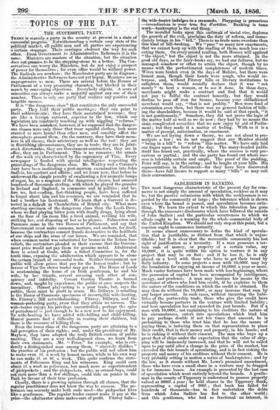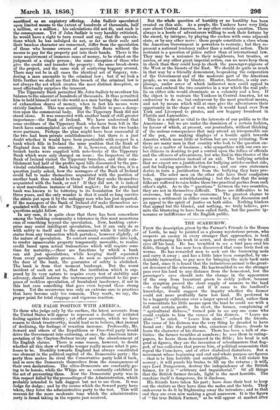SADLEIRISM IN BANKING.
THE most dangerous characteristic of the present day for com- merce is not simply the amount of speculation, reckless as it may be, but the passive submission with which the recklessness is re- garded by the community at large ; the tolerance which is shown Oven where the bound is passed, and speculation becomes swin- dling. We learn the extent to which this toleration has gone through the successive disclosures which have followed the suicide of John Sadleir and the particular occurrences to which we allude ought to be a warning for the whole commercial body of the United Kingdom. We should not only stop at this point, but a reaction ought to commence instantly.
It seems almost unnecessary to define the kind of specula- tion that is justifiable, as distinct from that which is unjus- tifiable; but it is clear that the mercantile community has lost sight of justification as a necessity. If a man possesses a cer- tain sum of- money, or property of a certain value, say 10,0001., it is quite within his option to venture it in any project that may be on foot ; and if he lose it, he is only placed on a level with those who have to get their bread by daily industry. In some projects a man with 10,000/. may lay the foundation for enjoying an income of 10,000/. a year or more. Much vaster fortunes have been made with less beginnings,where the possession of capital has been accompanied by intelligence, energy, and prudence. A man may increase his means by the assistance of others who lend him credit, if he explains to them the nature of the conditions on which the credit is obtained. He may thus do without the 10,000/., or may increase that sum by any larger amount. In such cases, without incurring the liabi- lities of the partnership trade, those who give the credit have virtually become partners in the venture with limited liability ; and here speculation has not exceeded its just bounds. But if a man with 10,000/., not explaining to his creditors the nature of his circumstances, enters into speculations which bind him' to pay perhaps double if not ten times that amount, he is pretending to those who trust him that he has the means of paying them, is inducing them on that representation to place their credit, that is their money and property, in his hands ; and he is risking it without their consent. The man who buys up a great fleet of ships under the expectation that the value of ship- ping will be immensely increased, and that he will not be called upon to pay until after a change in the price of the market, has exceeded the fair bounds of speculating, and is in fact risking the property and money of his creditors without their consent. He is very probably setting in motion a series of bankruptcies ; and by
the law, as it stands without Mr. Lowe's promised amen ,dment those who have even a small share in a venture may be dragged in for immense losses. An example is presented by the last case of speculation which went entirely beyond the bounds. A gentle- man in the county of Tipperary is understood to possess property valued at 30001. a year ; he held shares in the Tipperary Bank, representing a capital of 200!.; that bank has failed for hundreds of thousands—has in fact undertaken the debts from which John Sadleir has fled to the other world ; and this gentleman, who had so fractional an interest, is sacrificed as an expiatory offering. John Sadleir speculated upon limited means to the extent of hundreds of thousands, half a million, or a million ; his calculations did not fit, and such is the consequence. Yet if John Sadleir is very harshly criticized, he would have a right to turn round and say, that the specula- tions which he has indulged do not, so far as their scale and their baseless character are concerned, differ from the speculation of those who become owners of mercantile fleets without the means to pay for the property put into their hands. There is the same acquirement of immense sums of money, to be risked on the judgment of a single person ; the same deception of those who give the credit and transfer the property ; the same break-clown of the project, and the same risk of scattering beggary around. There may not be in all cases the identical act of forgery, ren- dering a man amenable to the criminal law ; but if we look a little further we shall see that this breach of the criminal law is not always the act which creates the most distinct deception, or most effectually surprises the innocent. The Tipperary Bank permitted Mr. John Sadleir to overdraw his balance to the amount of hundreds of thousands. It thus permitted him to hold himself out to the world as a man having the command of exhaustless shares of money, when in fact his means were strictly limited. This was assisting Mr. Sadleir to pass a decep- tion upon the commercial body. But the Tipperary Bank did not stand alone. It was connected with another bank of still greater importance—the Bank of Ireland. We have 'understood that some creditors of the Tipperary Bank who have been left in the lurch have contemplated an attempt to show that the two banks were partners. Perhaps the plan might have been successful if the two had been private establishments ; but there is a just doubt whether it would have been practicable with respect to a bank which fills in Ireland the same position that the Bank of
fr England does in this country. It is, however, stated that the branch banks were supplied with note-books Of the Tipperary Bank which were only charged on issue ; the Inspectors of the Bank of Ireland visited the 'Tipperary branches, and their esta- blishment had half of the profits upon bills discounted by the ppro- vincial establishment. Such being the relation of the two, it is a question justly asked, how the managers of the Bank of Ireland could fail to make themselves acquainted with the position of another bank thus related to skein? Did they make themselves acquainted with the bank, or not? If they did not, it is indeed a most marvellous instance of blind neglect; for the provincial bank was known to be tottering to its foundation for the last three years, and the only wonder is that it could so long survive the strain put upon it by the unhappy man who has just departed. If the managers of the Bank of Ireland did make themselves ac- 1 qw3inted with the state of the Tipperary Bank, 'still more serious questions might follow. In any case, it is quite clear that there has been somewhere among the bankta; g community a tolerance in this most monstrous ease of something beyond the speculation. Now' banking enter- prise may assist intelligent speculation, but it can only do so with safety to itself and to the community 'while it totally ab- stains from any transaction which partakes, however slightly, of the nature of speculation. To convert sound securities into cash, to render immoveable property temporarily* moveable, to realize credit based upon actual transactions which will require some time for maturity,—these are functions by which a bank can aid just speculations, while keeping itself separated from every speculative process. As soon as speculation enters the door of the bank, the guarantee of safety is abolished. The bank is from that moment bankrupt. But the worst incident of such an act is, that the institution which is sup- posed. by its indorse nature to require every test of stability and solvency, should. ndorse the instruments prostituted to the pur- poses of reckless speculation, of fraudulent insolvency, if not in this last case something that goes even beyond those strong terms. Yet the occurrence was only an extreme ease in practices that have become only too common. They mark, we say, the proper point for total stoppage and vigorous reaction.



























 Previous page
Previous page